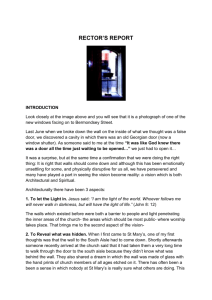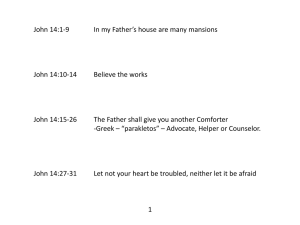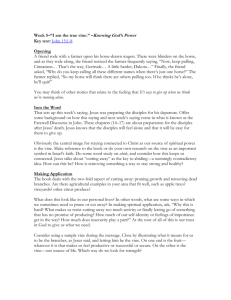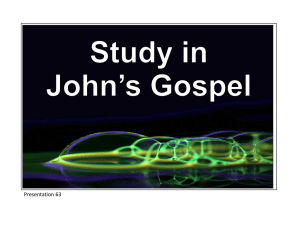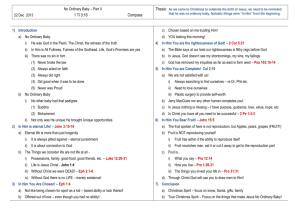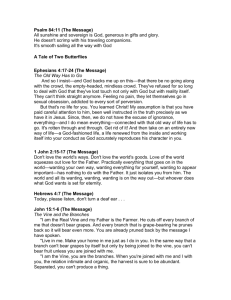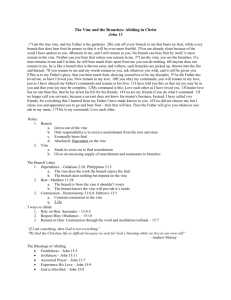Pray. (START ON SERMON SLIDE) Intro: My friend was having a
advertisement
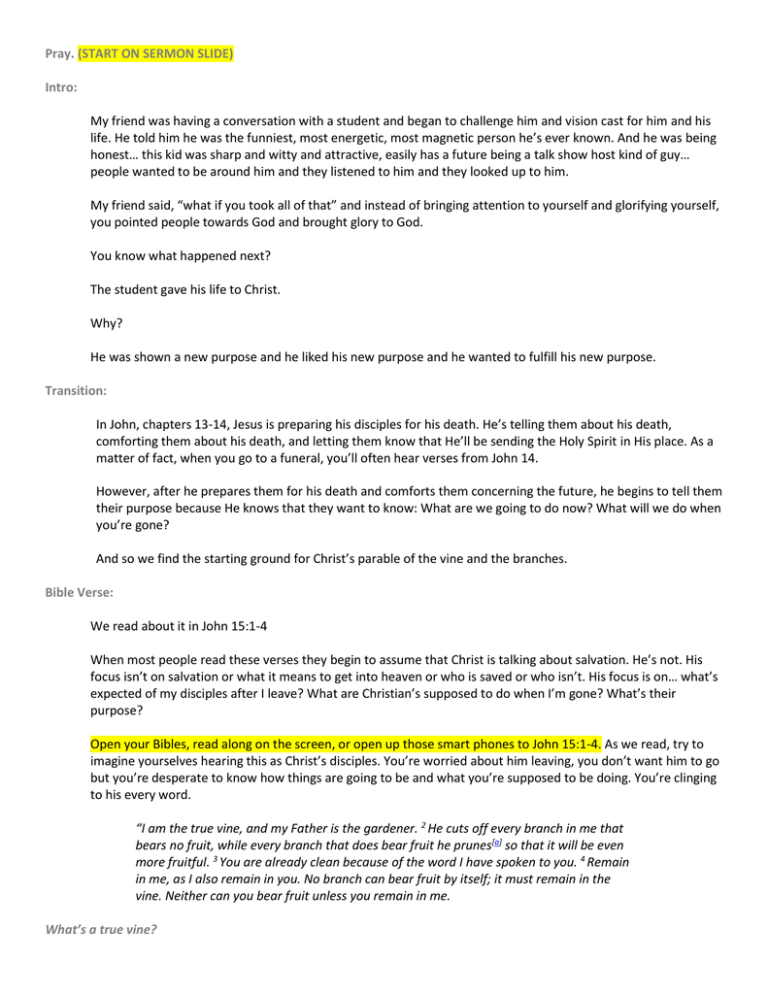
Pray. (START ON SERMON SLIDE) Intro: My friend was having a conversation with a student and began to challenge him and vision cast for him and his life. He told him he was the funniest, most energetic, most magnetic person he’s ever known. And he was being honest… this kid was sharp and witty and attractive, easily has a future being a talk show host kind of guy… people wanted to be around him and they listened to him and they looked up to him. My friend said, “what if you took all of that” and instead of bringing attention to yourself and glorifying yourself, you pointed people towards God and brought glory to God. You know what happened next? The student gave his life to Christ. Why? He was shown a new purpose and he liked his new purpose and he wanted to fulfill his new purpose. Transition: In John, chapters 13-14, Jesus is preparing his disciples for his death. He’s telling them about his death, comforting them about his death, and letting them know that He’ll be sending the Holy Spirit in His place. As a matter of fact, when you go to a funeral, you’ll often hear verses from John 14. However, after he prepares them for his death and comforts them concerning the future, he begins to tell them their purpose because He knows that they want to know: What are we going to do now? What will we do when you’re gone? And so we find the starting ground for Christ’s parable of the vine and the branches. Bible Verse: We read about it in John 15:1-4 When most people read these verses they begin to assume that Christ is talking about salvation. He’s not. His focus isn’t on salvation or what it means to get into heaven or who is saved or who isn’t. His focus is on… what’s expected of my disciples after I leave? What are Christian’s supposed to do when I’m gone? What’s their purpose? Open your Bibles, read along on the screen, or open up those smart phones to John 15:1-4. As we read, try to imagine yourselves hearing this as Christ’s disciples. You’re worried about him leaving, you don’t want him to go but you’re desperate to know how things are going to be and what you’re supposed to be doing. You’re clinging to his every word. “I am the true vine, and my Father is the gardener. 2 He cuts off every branch in me that bears no fruit, while every branch that does bear fruit he prunes[a] so that it will be even more fruitful. 3 You are already clean because of the word I have spoken to you. 4 Remain in me, as I also remain in you. No branch can bear fruit by itself; it must remain in the vine. Neither can you bear fruit unless you remain in me. What’s a true vine? We know from Pastor Tim’s sermons that it’s very possible that Jesus is walking along and points to a particular situation happening, like maybe a shepherd is separating some sheep from some goats. And so maybe Jesus is walking past a vineyard and sees a vine and takes the opportunity to use it as an object lesson and start drawing comparisons. I think though, there’s more to it this time than just that. I think He calls himself the true vine for very significant reasons. As Post New Testament Christians we see things a little bit differently than the original audience that Jesus was speaking to. We might assume that Jesus is talking about a vine because He’s alluding to communion (At least, that’s where my mind goes when I hear Jesus talking about a vine). But as with all scripture and especially Jesus’ parables, it’s important for us to know how these parables were understood originally. Jewish religious teachers taught in parables all the time. Jesus isn’t an exception. Actually, the majority of Jesus’ teaching was done in parable form. Either, because he really loved communicating the complex truths of the kingdom in this easy to understand way or because he knew his audience was used to learning this way. Either way, if we want to understand his parables, the way they’re meant to be understood, the first step is to start thinking like NT Jews. Jesus’ parables actually take place in the context of a vineyard on multiple occasions but this word “vine”…when Jesus calls himself the true vine... would automatically be interpreted by its hearers according to their understanding of the OT scriptures which utilizes vine imagery often. They might even think of Psalm 80:8-19 You transplanted a vine from Egypt; you drove out the nations and planted it. 9 You cleared the ground for it, and it took root and filled the land. 10 The mountains were covered with its shade, the mighty cedars with its branches. 11 Its branches reached as far as the Sea,[c] its shoots as far as the River.[d] 12 Why have you broken down its walls so that all who pass by pick its grapes? 13 Boars from the forest ravage it, and insects from the fields feed on it. 14 Return to us, God Almighty! Look down from heaven and see! Watch over this vine, 15 the root your right hand has planted, the son[e] you have raised up for yourself. 16 Your vine is cut down, it is burned with fire; at your rebuke your people perish. 17 Let your hand rest on the man at your right hand, the son of man you have raised up for yourself. 18 Then we will not turn away from you; revive us, and we will call on your name. So in that Psalm the vine is Israel. Jesus is saying, “I am the true vine.” The people listening would’ve understood that Jesus was claiming to be the right way to find favor with God. That the vine of Israel was a shadow of the true vine. Being in a right relationship with Jesus Christ was what it truly meant to be part of the Kingdom of God. That’s what Jesus was saying. Jesus had just gotten done telling his disciples he’d be leaving. So now He’s saying… don’t worry, you’ll still be connected to me, I’m the true vine, you’re the branches. Jesus is the true Israel, the genuine vine, the man of Gods right hand, as the psalmist puts it. What’s the purpose of a vine? Another reason that both the psalmist and Christ desire to use this vine imagery is because vines are only good for one thing: bearing fruit. In Ezekiel 15 God the Father says that the wood from the vine isn’t useful for anything. You can’t make furniture out of it, you can’t even use it as a peg to hang things on. It’s not like a tree… the wood of the vine is useless. If a vine isn’t bearing fruit – It’s failing at the only thing it has to offer. So it’s no wonder that verse 2 says 2 He cuts off every branch in me that bears no fruit This isn’t a verse on whether or not it’s possible for believers to lose their salvation and it’s not Christ’s main focus so it’s not going to be ours this morning either. The meaning Christ wants us to understand here is that a branch that bears no fruit is worthless. It’s not good for anything. he goes on to say… While every branch that does bear fruit He prunes (talking about the Father) so that it will be even more fruitful. One commentator pointed out the fact that in the OT, God the Father was referred to as the owner of the vineyard. It’s an interesting shift that Christ refers to God as the gardener, one who takes care of the vine. A much more intimate occupation than just being the landowner. Guys, you and I are branches on a vine whether we like it or not, and there’s only one thing that we’re good for, bearing fruit. If we don’t bear fruit, we’re cut off and laid aside. If we do bear fruit, we’re pruned so that we can be even more fruitful. Clearly, us bearing fruit seems to be God’s main concern with us. I love that, by the way, “If we do bear fruit, we’re pruned so that we can be even more fruitful. I was listening to K-Love and one of the DJs said that Christianity for Him was definitely a journey, definitely something he progressed at and he said that when he first gave his life to Christ he kept going to bars and getting drunk and getting in fights except now he was getting into fights over his faith. And now, he looks back and sees just how much pruning God had to do in his life in order for him to bear more and more fruit. But fruit bearing is clearly our end, our goal. It’s reiterated quite a few times but perhaps in verse 16, it’s most clear: 16 You did not choose me, but I chose you and appointed you so that you might go and bear fruit—fruit that will last—and so that whatever you ask in my name the Father will give you. Christ’s followers are chosen and appointed to go and bear fruit – fruit that will last. If you are not bearing fruit, then you are not performing your function and Christ wants us to understand – it’s your sole purpose. A Christian that doesn’t produce fruit is just as useless as a vine that doesn’t produce fruit. The only thing it’s good for is feeding the fire. Here’s the best thing: I think most of us in here want a purpose. Christ isn’t giving us bad news. Just like that student who gave his life to Christ once He knew what his purpose was - we want to know what our purpose is. What fruit should we bear and how do we do it? I think the obvious next question is, what fruit should we bear and how do we do it? All throughout the NT, fruit is talked about often. John the Baptist says we should produce fruit in keeping with repentance. Paul tells us about the fruit of the Spirit. New converts are often called “fruit” of one’s labor. Does Jesus mean all this fruit, every kind that’s mentioned in the NT? I think the quick and easy answer might be “yes.” Well, first of all, Jesus says in other places that healthy trees bear good fruit, but the diseased tree bears bad fruit. And so one of the first principles to understand is very simple: A lemon tree bears lemon fruit and so a follower of Christ ought to bear Christ fruit. The first obvious place in which Jesus alludes to what fruit he’s talking about is found in vv 7-8 7 If you remain in me and my words remain in you, ask whatever you wish, and it will be done for you. 8 This is to my Father’s glory, that you bear much fruit, showing yourselves to be my disciples. Commentator DA Carson puts it this way, “The branch’s purpose is to bear fruit, but the next verses show that fruit is the consequence of prayer in Jesus’ name, and is to the Fathers glory. This suggests that the fruit in the vine imagery represents everything that is the product of effective prayer in Jesus’ name, including obedience to Jesus’ commands, experience of Jesus’ joy, love for one another and witness to the world. This fruit is nothing less than the outcome of persevering dependence on the vine, driven by faith, embracing all of the believer’s life and the product of his witness.” Commentator F.F. Bruce makes it even plainer, “The fruit of which this parable speaks is in effect, likeness to Jesus” I think Christians get tired of hearing this, or maybe what I mean to say is that Christians get numb to hearing this. I also think that we (myself included) downplay what’s actually taking place when we bear fruit in accordance with the vine of Christ or Christ fruit or likeness of Christ. The sap that feeds the branches comes from Jesus Christ, the true vine. When you and I produce fruit according to Christ, what’s happening is Jesus is manifesting his power, his presence, his grace through us in tangible ways. When you and I do good things or become more like Jesus Christ or in other words bear fruit, we’re an active extension of Jesus Christ himself. Think about the disciples. They don’t want Christ to leave. They want to be with him forever. So Jesus is explaining how it is that they can be connected to him – be a part of the vine, bear fruit. When the disciples begin to bear fruit, or do things that make them look more like Jesus – for them they’re not just doing it because they know it’s good, they’re not just doing it because they think they ought to. They’re doing it because for them, it’s a tangible way of seeing Christ. It’s a reminder that they’re still connected to the savior that they love. It’s Christ’s prescription for their longing hearts. That’s certainly never something I would’ve considered before. What’s the secret to fruitfulness? So How can we be fruitful? John Piper calls it Christ’s Secret to Fruitfulness. He just mentions it in passing during one of his sermons but I love that phrase, “The secret to fruitfulness” Like, If you heard Christ say, “Wanna know the secret to fruitfulness?” I feel like we’d all lean in on the edge of our seats. Yet that’s what He’s doing. The Divine Son of God came to earth and said, “This is how you can be fruitful.” And guess what? He says it 10 times in the first 10 verses. Jesus has no intention on keeping this a secret. He doesn’t want you to miss it. The NASB makes it a little more clear for us. 4 Abide in Me, and I in you. As the branch cannot bear fruit [c]of itself unless it abides in the vine, so neither can you unless you abide in Me. 5 I am the vine, you are the branches; he who abides in Me and I in him, he bears much fruit, for apart from Me you can do nothing. 6 If anyone does not abide in Me, he is thrown away as a branch and dries up; and they gather them, and cast them into the fire and they are burned. 7 If you abide in Me, and My words abide in you, ask whatever you wish, and it will be done for you. 8 My Father is glorified by this, that you bear much fruit, and so [d]prove to be My disciples. 9 Just as the Father has loved Me, I have also loved you; abide in My love. 10 If you keep My commandments, you will abide in My love; just as I have kept My Father’s commandments and abide in His love. What’s the secret to fruitfulness? ABIDE IN CHRIST How? I think when we read these words slowly we can easily see what Christ has plainly set forth. Verse 7, if you abide in me and my words abide in you ask whatever you wish and it will be done for you. Two things: Prayer & God’s word. And in verse 10, it’s reiterated, If you keep Christ’s commandments, you will abide in His love, which can only be done if we know His commandments which is obtained through knowing God’s word. So Prayer and God’s Word. In an ordination ceremony, John Piper is delivering a heartfelt message to Pastor Glen Bloomstrom and he says something that I think applies to every single one of us, especially in light of this text. He says, “Glen, here is the first and decisive line of battle in your ministry. You must, you must resist everything that would pull you away from rigorous study of God's Word and daily hours of prayerful meditation to let that Word sink in and abide. The inwardly abiding word is a truth of Scripture believed, cherished, and rolled back and forth in the imagination until its implications spill over into daily life as love and joy and peace and righteousness. The Word will not abide within us if we are in a hurry. We pastors deceive ourselves when we are so busy doing good things that we snatch a text and a prayer on the run and think that we will be mighty men of God and bear spiritual fruit.” (and let me just say that because he’s addressing this message to a pastor at an ordination ceremony, his audience is a pastor who does preach sermons but very clearly, Jesus expects that all of us who are a part of the vine would bear fruit (whether we preach sermons or not), so most of what Piper has to say here is for you and should not be easily dismissed). He goes on to say “To be very specific, Glenn, so that you will remember it, almost no minister of the gospel will be a spiritually fruitful person if he is spending less than two hours a day in prayer and meditation in addition to his sermon preparation. Holy, powerful, life-changing spiritual men of God are not made on the run. There are so few people who believe that, Glen, that the expectations laid on you in the service will probably be a constant threat to your spiritual power and fruitfulness. But Christ has appointed you to go and bear fruit. So resist those expectations with boldness.” Jesus Christ is the true vine, we are the branches. We must be fruitful. Our fruitfulness comes from abiding in Christ through His word and through prayer. 10 times in 10 verses. You know what that sounds like? Abide, Abide, Abide, Abide, Abide, Abide, Abide, Abide, Abide, Abide. I don’t think anyone left that day thinking to themselves, “I wonder what Jesus wants me to do?” Closing: Pastor Tim mentioned before that all parables end with a decision or an action. They’re meant to evoke a response. And so again, imagine you’re the disciples. Jesus is leaving. You don’t understand at all how this could possibly be the best option. But you’re desperate to find out what Christ wants you to do. You want to know how to go on without Him. You want to know what you need to do next. And what does he say? 10 times he says “Abide in me.” What do you think you’ll do? If they were alive now, they’d read their Bibles every day. They’d pray every day. They wouldn’t let anything stop them from abiding in Christ. They wouldn’t let any outside pressure or internal justification keep them from abiding in Christ. When I was in South Dakota with a ministry team, we spent every day doing housekeeping work for like 9 hours a day maybe. And then we’d go back to our dorms and live with international students who were extremely extroverted and knew absolutely nothing about living independently. They relied on us for everything. They didn’t know how to use microwaves or ovens. One guy stored raw meet on a shelf in the dining room. When they took showers, they’d leave the inner curtain outside of the tub and the floor would have a gigantic puddle of water. It was like living with a bunch of toddlers. We’d also meet together every day to pray and worship and seek God’s will. It was the most exhausting thing I’d ever done. There was a girl on our team that did this every single summer. She loved it and not only that but she woke up earlier than everyone else by at least a couple hours and she’d climb a mountain and spend time with God praying and reading her bible. Her name was Tara, she’s my facebook friend if you want to verify this story. One day she felt like God was telling her to tell her brother and his pregnant wife that they were going to miscarry. Could you imagine being told that? And feeling like God was asking you to give the news? After talking to her pastor about it, they decided she should call and give the news. So she did and her brother and sister in law went to the hospital and sure enough, they had miscarried. Here’s the thing though. They felt loved that God had cared enough to tell them. They felt comforted to know that God was aware of the situation. Tara never would’ve had the opportunity to do that for them or for God if she hadn’t been abiding in Christ. Spending hours with God was the first thing she did every morning even though she had to be just as exhausted as the rest of us and God rewarded her all throughout the summer with opportunities to glorify Him. Jesus Christ is the vine, God is the Gardener and you are the branches. Your only job is to bear fruit. And the best way for you to do that, is to abide in Christ. Pray
